
The Phantom Empire is a 1935 American Western serial film directed by Otto Brower and B. Reeves Eason and starring Gene Autry, Frankie Darro, and Betsy King Ross. This 12-chapter Mascot Pictures serial combined the Western, musical and science-fiction genres. The duration of the first episode is 30 minutes, while that of the rest is about 20 minutes. The serial film is about a singing cowboy who stumbles upon an ancient subterranean civilization living beneath his own ranch that becomes corrupted by unscrupulous greedy speculators from the surface. In 1940, a 70-minute feature film edited from the serial was released under the titles Radio Ranch or Men with Steel Faces. This was Gene Autry's first starring role, playing himself as a singing cowboy. It is considered to be the first science-fiction Western.

Red River Valley, later retitled Man of the Frontier for American television screening, is a 1936 American Western film directed by B. Reeves Eason and starring Gene Autry, Smiley Burnette, and Frances Grant. Written by Dorrell and Stuart E. McGowan, the film is about a "ditch rider" and his sidekick who set out to find out who has been causing the accidents at a dam construction site.

Jasper Joseph Inman Kane was an American film director, film producer, film editor and screenwriter. He is best known for his extensive directorship and focus on Western films.

In Old Santa Fe is a 1934 American Western film directed by David Howard, starring Ken Maynard, George "Gabby" Hayes and Evalyn Knapp and featuring the first screen appearance of Gene Autry, singing a bluegrass rendition of "Wyoming Waltz" accompanied by his own acoustic guitar with Smiley Burnette on accordion. Autry and Burnette were uncredited, but the scene served as a screen test for the duo for subsequent singing cowboy films, beginning with The Phantom Empire (1935), in which Autry had his first leading role.

The Old Corral is a 1936 American Western film directed by Joseph Kane and starring Gene Autry, Smiley Burnette, and Irene Manning. Based on a story by Bernard McConville, the film is about a sheriff of a small western town who sings his way into a relationship with a singer from a Chicago nightclub who earlier witnessed a murder. The supporting cast features Lon Chaney Jr. and Roy Rogers.
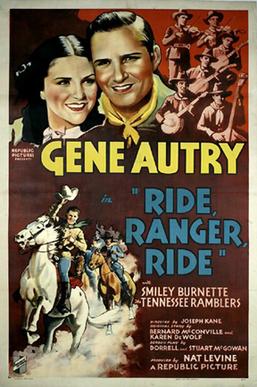
Ride Ranger Ride is a 1936 American Western film directed by Joseph Kane and starring Gene Autry, Smiley Burnette, and Kay Hughes. Based on a story by Bernard McConville and Karen DeWolf, and a screenplay by Dorrell and Stuart E. McGowan, the film is about a Texas Ranger working undercover to protect an Army wagon train full of ammunition and supplies. The Army doesn't believe him at first, until the Comanche arrive.

Springtime in the Rockies is a 1937 American Western film directed by Joseph Kane and starring Gene Autry, Smiley Burnette, and Polly Rowles. Written by Gilbert Wright and Betty Burbridge, the film is about a ranch owner who brings a flock of sheep into cattle country and faces the opposition of local ranchers with the help of her ranch foreman.
Round-Up Time in Texas is a 1937 American Western film directed by Joseph Kane and written by Oliver Drake. The film stars Gene Autry, Smiley Burnette, and Maxine Doyle. Despite its title, the majority of the film takes place in South Africa.

Man from Music Mountain is a 1938 American Western film directed by Joseph Kane and starring Gene Autry, Smiley Burnette, and Carol Hughes. Written by Betty Burbridge and Luci Ward, based on a story by Bernard McConville.
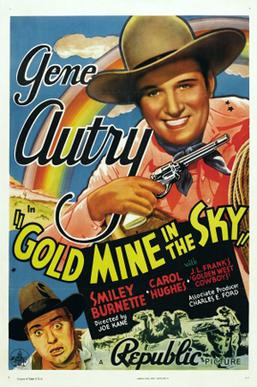
Gold Mine in the Sky is a 1938 Western film directed by Joseph Kane and starring Gene Autry, Smiley Burnette, and Carol Hughes. Based on a story by Betty Burbridge, the film is about a singing cowboy and ranch foreman who, as executor of the owner's will, must see that the daughter and heiress does not marry without his approval.
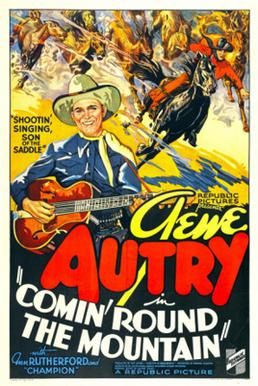
Comin' Round the Mountain is a 1936 Western film directed by Mack V. Wright and starring Gene Autry, Ann Rutherford, and Smiley Burnette. Based on a story by Oliver Drake, the film is about a Pony Express rider who is robbed and left to die in the desert, where he is saved by a wild horse he captures and later uses to round up other horses to be used in the race for a government contract.

The Singing Cowboy is a 1936 American Western film directed by Mack V. Wright and starring Gene Autry, Smiley Burnette, Lois Wilde and Lon Chaney Jr. Based on a story by Tom Gibson, the film is about a cowboy who decides to sing on television in order to raise money for the orphaned daughter of his former boss who was murdered.
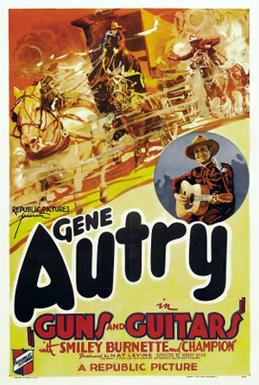
Guns and Guitars is a 1936 American Western film directed by Joseph Kane and starring Gene Autry, Smiley Burnette, and Dorothy Dix in her final film appearance. Written by Dorrell and Stuart E. McGowan, the film is about a singing cowboy who helps protect a county from fever-ridden cattle, and after being framed for murdering the sheriff, proves his innocence, gets elected sheriff, and then goes after the bad guy.

Mountain Rhythm is a 1939 American Western film directed by B. Reeves Eason and starring Gene Autry, Smiley Burnette, and June Storey. Based on a story by Connie Lee, the film is about a cowboy who organizes his fellow ranchers to oppose an Eastern promoter's land grab scheme.

Colorado Sunset is a 1939 American Western film directed by George Sherman and starring Gene Autry, Smiley Burnette, and June Storey. Written by Betty Burbridge and Stanley Roberts, based on a story by Luci Ward and Jack Natteford, the film is about a singing cowboy and his buddies who discover that the ranch they bought is really a dairy farm—and worse, it's subject to intimidation from a protection racket that prevents dairy products from safely reaching the market.
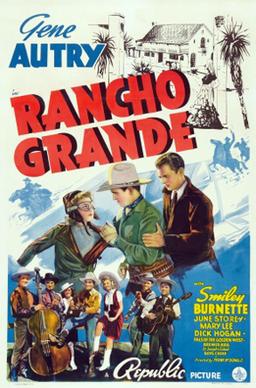
Rancho Grande is a 1940 American Western film directed by Frank McDonald and starring Gene Autry, Smiley Burnette, and June Storey. Written by Bradford Ropes, Betty Burbridge, and Peter Milne, based on a story by Peter Milne and Connie Lee, the film is about a singing cowboy and ranch foreman responsible for completing an important irrigation project and for the three spoiled grandchildren of his former boss who come out West to the ranch they inherited.
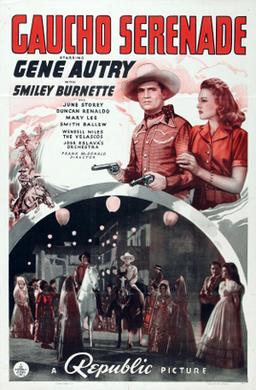
Gaucho Serenade is a 1940 American Western film directed by Frank McDonald and starring Gene Autry, Smiley Burnette, and June Storey. Written by Betty Burbridge and Bradford Ropes, the film is about a singing cowboy who goes up against a group of businessmen who plot to kidnap the son of a former partner so he won't testify against them.

Back in the Saddle is a 1941 American Western film directed by Lew Landers and starring Gene Autry, Smiley Burnette, and Mary Lee. Written by Richard Murphy and Jesse Lasky Jr., the film is about a singing cowboy who attempts to bring peace between ranchers and the operator of a copper mine whose chemicals are poisoning the area's water supply. The film features several of Autry's hit songs, including "Back in the Saddle Again", "I'm An Old Cowhand", and "You Are My Sunshine".
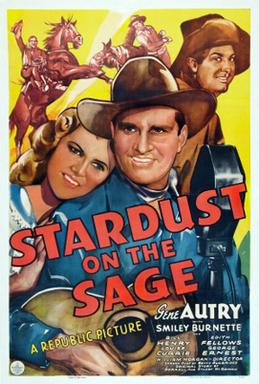
Stardust on the Sage is a 1942 American Western film directed by William Morgan and starring Gene Autry, Smiley Burnette, William Henry, and Edith Fellows. Written by Betty Burbridge, based on a story by Dorrell and Stuart E. McGowan, the film is about a singing cowboy who helps his fellow ranchers against a corrupt mine superintendent looking to steal the mine in which they've invested. The film soundtrack features two duets by Autry and Fellows, "When the Roses Bloom Again" and "I'll Never Let You Go, Little Darlin'". The final scene includes an innovative audience sing-along medley of the classics "You Are My Sunshine", "Home on the Range", and "Deep in the Heart of Texas", with Burnette conducting and the words appearing at the bottom of the screen.

Call of the Canyon is a 1942 American Western film directed by Joseph Santley and starring Gene Autry, Smiley Burnette, the Sons of the Pioneers, and Ruth Terry. Based on a story by Maurice Rapf and Olive Cooper, the film is about a singing cowboy who leads a group of cattlemen against the corrupt agent of a large packing company looking to swindle them by undercutting the buying price for beef. The film features three songs by Autry and the Sons of the Pioneers, including the classic "Take Me Back to My Boots and Saddle".



















